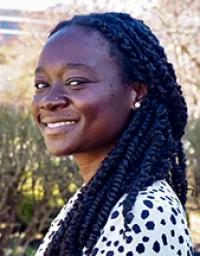RAP Impact Awardees: Spring & Fall 2018 (compiled: April/May 2023)
Mallar Bhattacharya, MD
Associate Professor – Medicine
School of Medicine
Pilot for Early Career Investigators (formerly: Junior Investigators in Basic & Clinical/Translational Sciences)
Macrophage function in lung fibrosis
Awarded $ 40K – Fall, 2018
How did the RAP grant allow for further funding and/or publications?
The RAP grant led to data that directly supported an R01-equivalent DOD proposal that was successful.
What was the type of follow-up funding since the initial RAP award?
We subsequently received a DOD award which is helping me grow my program.
What is the focus of your research today?
Our current research focuses on macrophage-fibroblast interactions in lung injury.
Additional/final comments:
I think the RAP program is so important for supporting early to mid-stage investigators.This is real, tangible institutional support as well as scientific feedback, and it makes all the difference. Thank you for the work that you do!
Akua Gyamerah, DrPH, MPH
Post-Doc – Medicine/CFAR
School of Medicine
Mentored Scientist Award Program in HIV/AIDS
A Formative Assessment of the Continuum of Care Needs of HIV-Positive Men who Have Sex with Men
in Ghana
Awarded $ 30K – Spring, 2018
How did the RAP grant allow for further funding and/or publications?
The RAP grant provided me with funding needed to conduct a pilot study that informed the development of my K01 grant, which was funded in August 2022. In addition, based on the findings from my RAP grant, I have one peer reviewed publication in press at PLOS Global Health (“PrEP knowledge, acceptability, and implementation in Ghana: Perspectives of HIV service providers and MSM, trans women, and gender diverse individuals living with HIV”).
I also have a manuscript that was presented at AIDS 2022 and will soon to be submitted for review at AIDS and Behavior.
What was the type of follow-up funding since the initial RAP award?
I was awarded a K01 Mentored Research Scientist Development Award. The award provides support for a study that integrates intersectionality and minority stress theory to examine the impact of intersectional social stressors on mental health and HIV treatment outcomes among Ghanaian MSM living with HIV and to adapt and theater test a community-engaged intersectional stigma intervention to improve mental health and HIV treatment outcomes. The grant also supports content training in intersectional stigma and minority stress and mental health, as well as methodological training in advanced statistical methods, measurement, and intervention development.
What is the focus of your research today?
My research broadly aims to understand the multilevel and intersectional determinants of health disparities among racial, sexual and gender minorities, including how historical and socio-structural factors such as racism, intersectional stigma, violence, and criminalization shape disease outcomes among these populations.
I have two current projects. The first, funded by NIMH’s K01 Research Career Development Award, examines how intersectional social stressors affect mental health and HIV treatment outcomes among HIV-positive gay, bisexual, and other men who have sex with men. My second project—previously funded by NIAAA’s Diversity Supplement, explores the impact of gender-based violence and the COVID-19 pandemic on alcohol use and alcohol treatment among gender minorities in the San Francisco Bay Area.
Noelle L'Etoile, PhD
Professor – Cell & Tissue Biology
School of Dentistry
Pilot for Established Investigators (formerly Established Investigators in Basic and Clinical/Translational Sciences)
The cell biological role of sleep in memory consolidation - a focus on the synapse
Awarded $ 50K – Spring, 2018
How did the RAP grant allow for further funding and/or publications?
The RAP grant allowed me to hire an amazing postdoc, Dr. Rashmi Chandra whose hard work entails the basis of an R01 grant based on sleep and memory and another on sleep and synapse remodeling. The funding also allowed me to supplement an F31 grant of Ray Dunn, an exceptional graduate student.
What was the type of follow-up funding since the initial RAP award?
The funding allowed us to finish the work needed for a paper on sleep and synapse remodeling that was just accepted (informally) for publication in Cell.
What is the focus of your research today?
The focus of my research is on sleep and memory, and we are now entering the field of sleep and aging and memory with another, new RAP award.
Huinan Li, PhD
Postdoc – Ophthalmology
School of Medicine
Alzheimer Disease Research Center (ADRC) Developmental Projects
Defining the Role of Granulin in Astrocyte Function and Neurodegeneration
Awarded $75 K – Fall, 2018
How did the RAP grant allow for further funding and/or publications?
The RAP grant allowed me to to continue my research during the COVID-19 pandemic, and I have published one book chapter, and am in the process of submitting a scientific manuscript for publication currently under review.
What was the type of follow-up funding since the initial RAP award?
No follow-up funding was received since the initial RAP award was issued.
What is the focus of your research today?
I am currently working on iPSC induced neuron, astrocytes, microglia, macrophages, 2D and 3D cerebral organoid CRISPR screen for disease relevant biology discovery. Particularly, I work on areas like brain tumor screening and lysosomal storage disorder screening using cerebral organoids and iPSC induced macrophage
Additional/final comments:
Thanks to RAP Award, I was able to continue my research as a postdoc during the pandemic and continue with the training grant that helped me land my current role as a specialist at a Laboratory for Genomics Research. I am grateful for this funding opportunity.
Catherine Oldenburg, ScD, MPH
Associate Professor – Ophthalmology
School of Medicine
Pilot for Early Career Investigators (formerly: Junior Investigators in Basic & Clinical/Translational Sciences)
Azithromycin as adjunctive therapy for the treatment of uncomplicated severe acute malnutrition
Awarded $40 K – Fall, 2018
How did the RAP grant allow for further funding and/or publications?
Our group received a RAP grant to support a pilot trial (N=300) of amoxicillin versus azithromycin as adjunctive treatment for uncomplicated severe acute malnutrition. The funds allowed our group to expand existing clinical trial infrastructure in nutrition clinics in rural Burkina Faso and laid the groundwork for a new line of research in severe acute malnutrition that now is a primary focus of my group’s work.
The RAP award led to an R21 and the following publications:
1. CE Oldenburg, A Hinterwirth, C Dah, M Ourohire, B Coulibaly, M Ouedraogo, A Sié, C Chen, L Zhong, K Ruder, E Lebas, F Nyatigo, BF Arnold, KS O’Brien, T Doan. Gut microbiome among children with uncomplicated severe acute malnutrition in a randomized controlled trial of azithromycin versus amoxicillin. Am J Trop Med Hyg. Epub 12 Dec 2022.
2. CE Oldenburg, A Hinterwirth, M Ouohiré, C Dah, M Ouédraogo, A Sié, V Boudo, C Chen, K Ruder, L Zhong, E Lebas, F Nyatigo, BF Arnold, KS O’Brien, T Doan. Gut resistome after antibiotics among children with uncomplicated severe acute malnutrition: a randomized controlled trial. Am J Trop Med Hyg. 2022 Jun;107(1):59-64.
3. C Dah, M Ourohire, A Sié, M Ouédraogo, M Bountogo, V Boudo, E Lebas, F Nyatigo, BF Arnold, KS O’Brien, CE Oldenburg. How does baseline anthropometry affect anthropometric outcomes in children receiving treatment for severe acute malnutrition? A secondary analysis of a randomized controlled trial. Matern Child Nutr. Epub 14 February 2022.
4. KS O’Brien, A Sié, C Dah, M Ourohire, M Ouédraogo, V Boudo, AM Arzika, E Lebas, F Nyatigo, WW Godwin, JD Kelly, BF Arnold, CE Oldenburg. Comparing azithromycin to amoxicillin in the management of uncomplicated severe acute malnutrition in Burkina Faso: a pilot randomized trial. Am J Trop Med Hyg. Epub 10 Jan 2022.
5. A Sié, C Dah, M Ourohiré, M Ouedraogo, V Boudo, A Arzika, E Lebas, F Nyatigo, BF Arnold, KS O’Brien, CE Oldenburg. Azithromycin versus amoxicillin and malarial parasitemia among children with uncomplicated severe acute malnutrition: a randomized controlled trial. Am J Trop Med Hyg. Epub 27 Sept 2021.
6. KS O’Brien, A Sié, C Dah, M Ourohire, AM Arzika, V Boudo, E Lebas, WW Godwin, BF Arnold, CE Oldenburg. Azithromycin for uncomplicated severe acute malnutrition: study protocol for a pilot randomized controlled trial. Pilot Feasibility Stud. 2021 Apr; 7(1):97.
What was the type of follow-up funding since the initial RAP award?
My group received an R21 grant from the NICHD as follow-up funding support.
What is the focus of your research today?
My current research focus is on prevention and treatment of malnutrition in young west African children, prevention of childhood mortality using antibiotics, and the interaction between infection and malnutrition in settings with large burdens of both.
Additional/final comments:
The RAP award allowed my group to expand our work in severe and acute malnutrition, which is a substantive area in which our work continues to grow.
Anne Richards, MD, MPH
Professor – Psychiatry
School of Medicine
Digital Mental Health Award Track
Understanding Sleep Disturbance in PTSD: Assessing the Usability of a New Sleep Diary App and Examining the Sleep Physiological Characteristics of Disturbed Sleep Using a Multimodal Technology Approach
Awarded $ 40K – Spring, 2018
How did the RAP grant allow for further funding and/or publications?
The RAP grant provided feasibility data leading to a DOD funded award. It also provided data for several presentations, one publication to date with several publications currently in preparation.
What was the type of follow-up funding since the initial RAP award?
Thanks to the RAP seed award funding, I received extramural DOD funding to conduct a larger observational study of sleep disturbance in PTSD. Furthermore, funding support yielded critical pilot data indicating that a mobile app (field-tested with RAP funding) is an appealing, user-friendly tool for collection of sleep behavioral and mental health data. I use this mobile app extensively in my research.
What is the focus of your research today?
I continue to expand my clinical and translational research that focuses on sleep and mental illness, particularly PTSD. See the Richards Lab website.
Additional/final comments:
The RAP program is an outstanding resource for junior and more established faculty, for both the jump-starting of a research career and for obtaining pilot data to expand the horizons of more established researchers. Thank you RAP!
Catherine Smith, MD
Associate Professor – Medicine
School of Medicine
Shared Technology Awards
High-Throughput Single Cell Sequencing to Resolve Tumor Heterogeneity
Awarded $ 35K – Fall, 2018
How did the RAP grant allow for further funding and/or publications?
This RAP grant funded the purchase of a Mission Bio Tapestri single cell DNA sequencing machine. This machine has been used in multiple projects since its acquisition, which have been published in Blood Advances, Cancer Discovery and Nature Communications. We also have multiple publications in preparation using this technology.
What was the type of follow-up funding since the initial RAP award?
We have received 1 subsequent R01 and have one pending R01 scored in the 9th percentile. The RAP funding support also aided my receiving a Damon Runyon Clinical Investigator Continuation award and an LLS Clinical Scholar award.
What is the focus of your research today?
The focus of our research remains on identifying resistance mechanisms to targeted therapy in AML as well as defining the role of genetics and tumor heterogenetity in predicting response to treatment in high risk leukemias.
Additional/final comments:
This RAP grant facilitated the purchase of novel technology that has become a mainstay of research in our lab and has allowed us to become a leader in the field of single cell DNA sequencing technology translational research.
Kathleen Tebb, PhD
Professor – Pediatrics
School of Medicine
Pilot for Established Investigators (formerly Established Investigators in Basic and Clinical/Translational Sciences)
Health-E Males: The Development and Pilot Testing of an mHealth App to Promote Patient-Centered Sexual Health Information and Services for Adolescent Boys
Awarded $ 50K – Fall, 2018
How did the RAP grant allow for further funding and/or publications?
The RAP funding mechanism provides UCSF investigators with phenomenal opportunities to advance their research and career. As an early career investigator, I received my first RAP award for developing an app to support adolescent contraceptive decision-making and facilitate the delivery of patient-centered care. The initial funding allowed me to develop the app and gather pilot data that was used for a successful PCORI proposal to conduct a cluster-randomized trial to evaluate the app. The Health-E You/Salud iTu™ app, when used in conjunction with a school-based health center (SBHC), increased sexually active Latina adolescents' use of effective contraception by 118% compared to a 46% increase for adolescents seeking care at the control SBHCs. Based on those findings, PCORI subsequently awarded additional funding to disseminate the app to SBHCs across the U.S. while evaluating its implementation and effectiveness with a broader population of adolescents.
What was the type of follow-up funding since the initial RAP award?
Since the original app was focused on adolescents at-risk of unintended pregnancy, our clinical partners and adolescent advisors requested we build content to reach all adolescents regardless of gender identity or sexual activity status. Once again, the RAP funding mechanism played a critical role in funding this preliminary work. I am now working with researchers from John Hopkins School of Medicine, with funding from the National Institute of Child Health and Development, to expand the Health-E You/Salud iTu™ app with tailored content for young people assigned male at birth, inclusive of gender-expansive youth.
What is the focus of your research today?
My current research focuses on a new partnership with international researchers to support patient-centered contraception for young women seeking abortion services. In consideration of the Dobb's decision in the U.S., I have been approached by health leaders in states who can no longer provide abortion services, to use the app as a tool to reduce unintended pregnancy for adolescents and young adults whenever they access care whether it be in primary or urgent care settings. We are also looking forward to building on this work to address a significant gap in SRH knowledge and care for adolescents and young adults with mild to moderate learning disabilities and young adults in the community college setting.
Additional/final comments:
In addition to receiving a RAP award, I am honored to serve as a RAP reviewer. I have experienced first-hand how the RAP review process can improve investigators' research proposals. RAP provides critical foundation (“seed”) funding through a wide range of specific grant mechanisms that ultimately leads to successful extramural funding.







